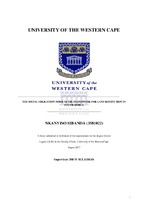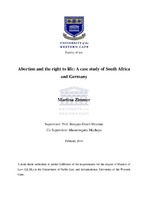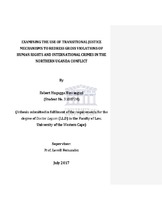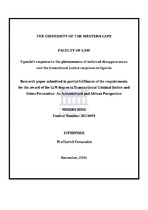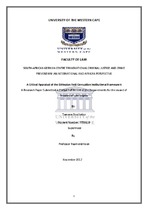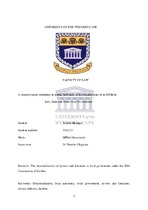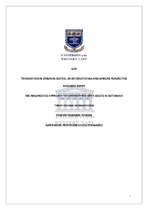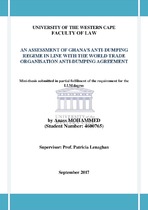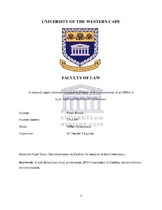Search
Now showing items 461-470 of 499
The Social Obligation Norm as the Framework for Land Restitution in South Africa
(University of the Western Cape, 2017)
This research project proposes that the social-obligation norm of ownership should be
adopted as the ethic on which land restitution is carried out in South Africa. While there
exists a subtle and indirect appreciation of ...
Abortion and the right to life: A case study of South Africa and Germany
(University of the Western Cape, 2016)
The issue of abortion and the protection of the right to life have been discussed by many academics,
yet remains an unresolved topic in many countries. The mere fact that abortion is the deliberate
termination of a human ...
Examining the use of transitional justice mechanisms to redress gross violations of human rights and international crimes in the northern Uganda conflict
(University of the Western Cape, 2017)
Uganda and her citizens have endured a troubled, violent, conflict-prone history since
independence from the British on 9th October 1962. Conflict in Uganda, just like in many an
African country, has its primary root ...
Uganda's response to the phenomenon of enforced disappearances and the transitional justice response in Uganda
(University of the Western Cape, 2016)
Enforced disappearances are a heinous violation of numerous human rights enshrined
in many international conventions. However, they have not been adequately addressed
in many jurisdictions. This crime is very common within ...
South-African german centre transnational criminal justice and crime prevention: An international and African perspective
(University of the Western Cape, 2017)
Corruption is a global problem, which poses a serious threat to the development of
countries and their people. Although its impact varies, all nations are facing the evils of
corruption and, therefore, the international ...
The decentralisation of powers and functions to local government under the 2016 Constitution of Zambia.
(University of the Western Cape, 2018)
At independence in 1964, the United National Independence Party (UNIP)-led government in
Zambia was, among other things, confronted with the challenge of transforming an inherited
dual, undemocratic, racist and exploitative ...
The fragmented approach to confiscating dirty assets in Botswana
(University of the Western Cape, 2018)
In the early 1990s Botswana faced rising levels of grand corruption and economic crimes in
general. The laws could not cope with the high incidence of economic criminality, especially
as regards the confiscation of dirty ...
An assessment of Ghana's anti-dumping regime in line with the World Trade Organisation Anti-Dumping Agreement
(University of the Western Cape, 2017)
The establishment of an anti-dumping regime has become commonplace for many a
government that seeks to protect and promote its local industries. One reason which appears to
be dominant by its proponents is the need to curb ...
Decentralisation in Zambia: An analysis of local democracy.
(University of the Western Cape, 2018)
Zambia has had a system of local government whose origin can be traced back to the colonial
era. This system of local government, which is comprised by local authorities, did not have
constitutional recognition. The 1996 ...
A Critical analysis of section 129 of the companies act 71 of 2008
(University of the Western Cape, 2017)
A company forms an important part of a community in which it conducts business. It,
therefore, has a direct impact on the economic and thus the social well-being of that
community through its employees, suppliers and ...

